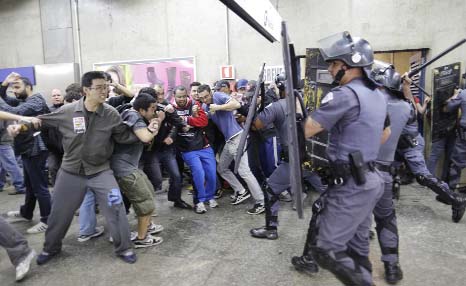
BBC Online :
Police in Brazil have used tear gas to break up protesters on the second day of a metro strike that has left Sao Paulo’s transport in chaos.
Nearly half of the stations were closed and there was gridlock on the streets of Brazil’s largest city, which will host the opening match of the World Cup next Thursday.
Workers are demanding a pay rise of at least 10%. A new round of negotiations has failed and the strike will continue.
A third of Sao Paulo’s metro stations were closed on Friday morning, and there were more than 200km (125 miles) of traffic jams across the city in the morning rush hour.
Police fired tear gas and used batons and shields at a demonstration outside Ana Rosa station in central Sao Paulo.
A military police spokesman said officers intervened after clashes broke out between picketing strikers and commuters trying to enter the station. Brazil beat Serbia 1-0 on Friday afternoon in a friendly played at a Sao Paulo stadium that will not be used during the World Cup, Morumbi.
The underground strike and persistent rain tested the patience of some 60,000 fans who turned up for Brazil’s last match before the tournament begins.
The World Cup will kick off on 12 June with a match between the hosts Brazil and Croatia at the Itaquerao stadium, or Arena Corinthians, in the outskirts of Sao Paulo. Football’s world governing body, Fifa, said on Thursday it was confident the World Cup would be a success.
“I’m an optimist. After the tournament kicks off, I think there will be a better mood,” Fifa president Sepp Blatter said on Thursday.
The Brazilian government is under a huge amount of pressure as the only viable way for fans to reach the Itaquerao stadium for the World Cup is on public transport, says the BBC’s Katy Watson in Sao Paulo.

